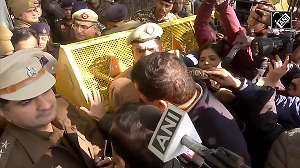India's landmark nuclear deal with the United States has secured bipartisan support in America, but New Delhi must separate its civilian and military facilities before the agreement is passed before the US Congress, Democrat leader John Edwards said Wednesday.
"I think the support for this deal is bipartisan (in the United States)," Edwards, a likely US presidential candidate for 2008, said in response to a question during the Hindustan Times Leadership Summit in New Delhi.
In July, India and the United States agreed to co-operate in civilian nuclear energy programmes. Seen as a boost for India, which has not signed the non-proliferation treaty, the deal requires the Bush administration to change US law to allow the agreement with New Delhi to go through.
Complete coverage: Dr Singh in the US
But the move by the US government to make an exception in case of India has earlier raised concern in the US Congress, with opposition voiced by both Republicans and Democrats.
"Some members of the US Congress are sceptic. India needs to show them evidence... and separate its civilian and nuclear facilities," Edwards remarked.
He described the India-US nuclear agreement as a "very good step forward" for both countries when asked whether Democrats would continue to support the deal in the event of their winning power in the 2008 elections.
Edwards, the Democrat Party nominee for vice- president in 2004, also backed India's bid for the UN Security Council. "They (the international community) have to find a place for India in the Security Council."
Edwards, a former US Senator, described India as an emerging global power, saying the country now had a greater role to play on the international level. Both the US and India, he said, were required to address a range of issues like crippling poverty, terrorism, proliferation of the weapons of mass destruction and AIDS. Alleviation of poverty has to become a top priority, Edwards said, adding that his own country was home to as many as 37 million people living in poverty.
In his comments on the outcry over outsourcing in his country, Edwards said he believed the US should accept globalisation as a challenge. "People losing jobs is a shorter term issue." And in an apparent effort to position himself for the 2008 presidential race in the United States, where public support for the Iraq war has diminished, Edwards said he was wrong when he voted in 2002 to support an invasion of Iraq. "My own vote was a mistake and I take responsibility," he said






 © 2025 Rediff.com -
© 2025 Rediff.com -